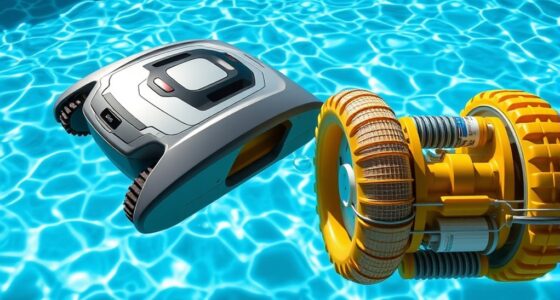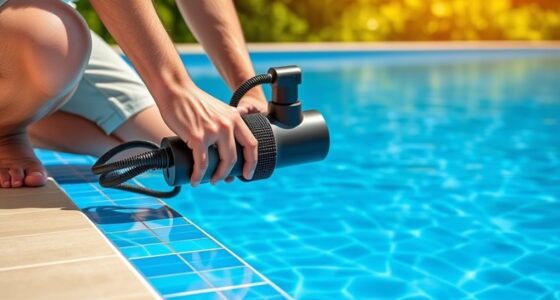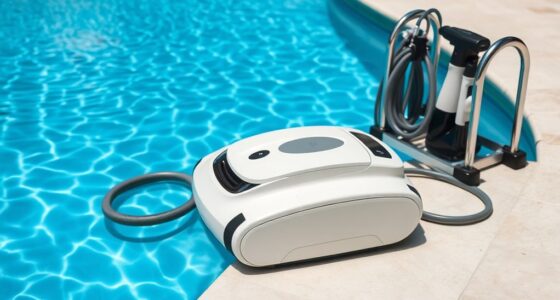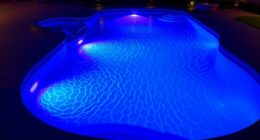How often you should run your suction pool cleaner depends on your pool’s size, shape, usage, and environmental factors. Generally, running it at least twice a week keeps your pool clean and clear, especially during periods of high usage or stormy weather. Regular cleaning prevents debris buildup and maintains water quality. To discover more tips on optimizing your pool maintenance schedule, keep exploring effective cleaning strategies tailored to your needs.
Key Takeaways
- Run the cleaner at least twice a week during peak usage or after storms for optimal debris removal.
- Increase cleaning frequency in environments with high debris, such as windy or leafy areas.
- Adjust cleaning schedule based on pool size, shape, and level of usage to maintain water clarity.
- Regularly inspect and clean filters to ensure the suction cleaner operates efficiently.
- Monitor water clarity and debris buildup; clean more often if water appears cloudy or debris accumulates quickly.
Factors Influencing Cleaning Frequency
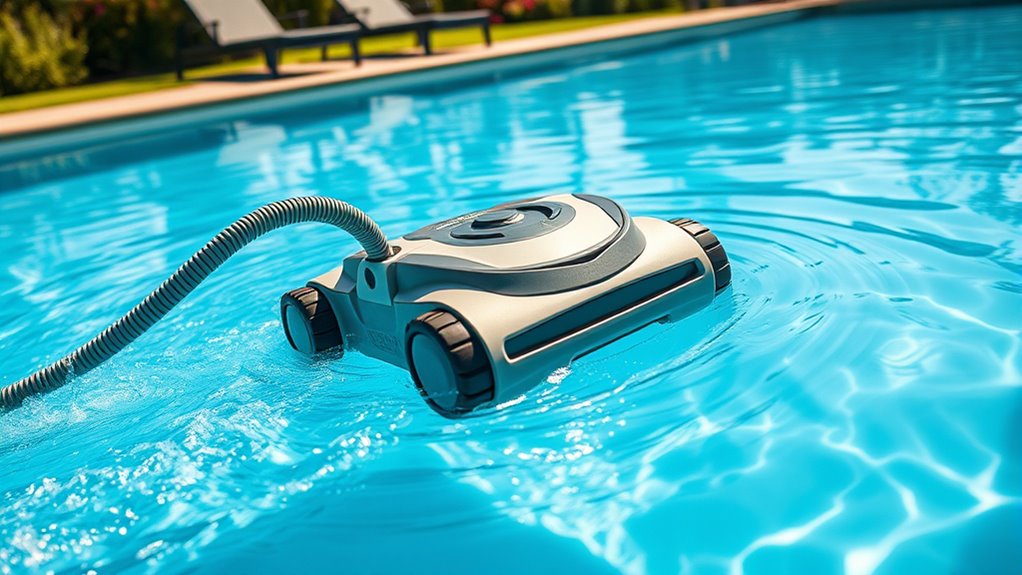
Several factors determine how often you should run your pool cleaner, and understanding these can help you keep your pool sparkling. One key factor is chemical balance; if your pool’s pH and chlorine levels aren’t maintained, debris and algae can accumulate faster, requiring more frequent cleaning. Equipment maintenance also plays a role—well-maintained filters and pumps reduce debris buildup, lessening the need for constant cleaning. Additionally, environmental conditions like wind, rain, and nearby trees can increase debris in your pool. If your pool sees heavy use or experiences frequent storms, you’ll need to run your cleaner more often. Monitoring these factors helps you develop a cleaning schedule tailored to your pool’s specific needs, keeping it clear and inviting with less effort.
Daily vs. Weekly Cleaning Schedules
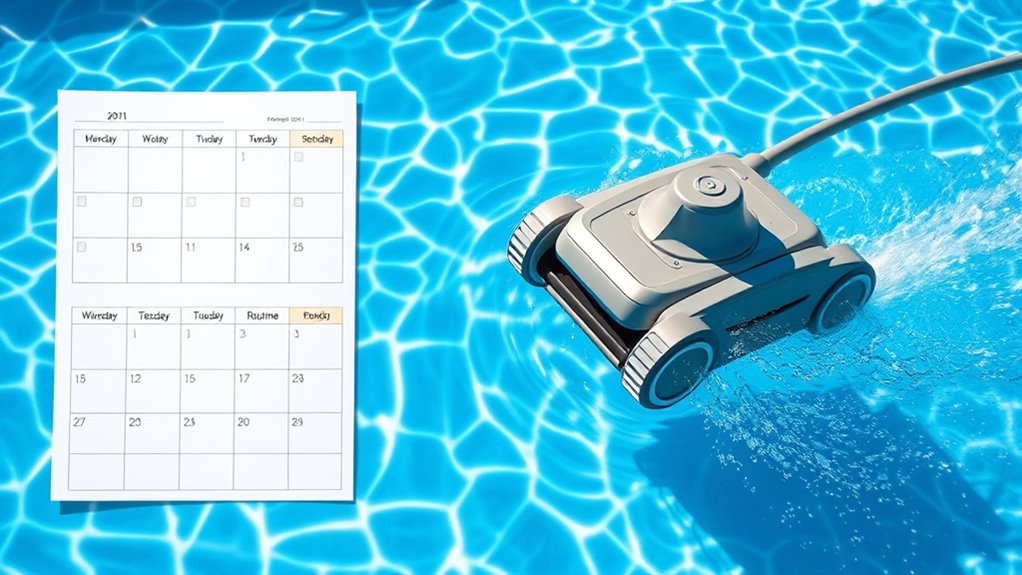
Your pool’s dirt buildup depends on how often it’s used and the surrounding environment. If your area sees a lot of debris or your pool gets frequent use, daily cleaning might be necessary. Otherwise, a weekly schedule could keep your pool clean without overdoing it. Implementing a consistent cleaning routine aligns with best practices in preventing vulnerabilities, ensuring your pool remains safe and inviting. Additionally, selecting the right cleaning frequency can enhance customer engagement by maintaining optimal water quality and appearance, which is especially important for pools in high-traffic or debris-prone areas. Regular maintenance also contributes to longer equipment lifespan, reducing the need for costly repairs or replacements over time. Moreover, understanding the types and features of pool cleaners can help you choose the most effective cleaning schedule for your situation.
Dirt Accumulation Rate
Since dirt tends to accumulate at different rates depending on your pool’s environment, understanding how quickly debris gathers can help you choose the right cleaning schedule. If your water has imbalanced chemicals or poor water circulation, debris, algae, and dirt settle faster, requiring more frequent cleaning. Regularly checking chemical levels ensures the water stays balanced, which slows dirt buildup. Good water circulation keeps debris suspended and prevents it from settling quickly. Proper filtration systems, such as HEPA filters, can enhance debris removal efficiency. In such environments, running your suction pool cleaner daily might be necessary to maintain clarity. Additionally, integrating AI-enabled filtration systems can optimize cleaning cycles based on real-time debris levels. Incorporating smart pool technology can further improve monitoring and maintenance, ensuring optimal cleanliness. Moreover, considering regular maintenance checks helps identify potential issues early and maintain overall water quality. Understanding the dirt accumulation rate in your specific pool environment is crucial for adjusting your cleaning frequency effectively.
Pool Usage Frequency
How often you should run your pool cleaner depends heavily on how frequently you use the pool. If you swim daily, running your cleaner at least once a day helps maintain a balanced pool chemical and water temperature, preventing algae buildup and debris accumulation. For weekly swimmers, a thorough cleaning every few days usually suffices, especially if the pool’s chemical balance is well-maintained. High water temperatures can accelerate algae growth and debris breakdown, so more frequent cleaning may be necessary in warmer months. Conversely, cooler water temperatures slow this process, allowing for less frequent runs. Monitoring your pool’s chemical balance and water temperature helps determine the best cleaning schedule, ensuring your pool stays clean, safe, and inviting without overusing your cleaner. Additionally, understanding debris accumulation patterns can help optimize cleaning frequency to keep your pool pristine. Regularly checking and adjusting your pool’s filtration system also enhances overall cleanliness and reduces the frequency needed for mechanical cleaning.
Environmental Factors Impact
Environmental factors play a crucial role in determining whether you should clean your pool daily or weekly. If your pool is exposed to lots of debris, leaves, or dust, you might need to run your suction pool cleaner more often to maintain proper chemical balance and prevent algae buildup. Poor weather conditions, like wind or storms, can introduce contaminants quickly, requiring increased cleaning frequency. Additionally, regular equipment maintenance ensures your cleaner functions efficiently, reducing the need for daily cleanings when conditions are less demanding. Moreover, understanding your local climate and water chemistry can help you establish an optimal cleaning schedule tailored to your specific environment. For example, debris accumulation varies significantly depending on your surroundings, influencing how often you need to clean your pool. Changes in water temperature can also impact algae growth and bacterial activity, affecting cleaning needs. In some cases, environmental monitoring tools can provide real-time data to optimize maintenance routines and minimize resource usage. Conversely, if your pool is in a protected area with minimal debris, a weekly schedule may suffice. Monitoring water chemistry regularly helps you adjust cleaning frequency based on environmental influences, keeping your pool safe, clear, and properly balanced. Incorporating renewable energy sources into your home can also reduce the environmental impact of pool maintenance by lowering energy consumption and emissions.
Impact of Pool Size and Shape
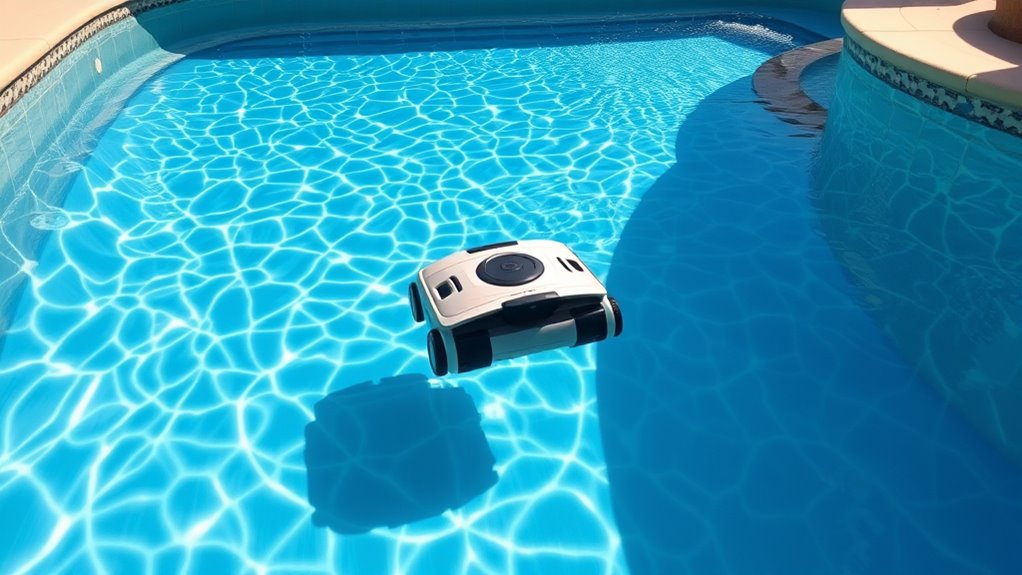
The size and shape of your pool directly affect how often you should run your cleaner. Larger surface areas mean more debris for it to collect, so it may need more frequent runs. Pools with complex shapes or many corners can also require additional cleaning to reach all areas effectively. Additionally, viral trends on platforms like TikTok can influence how often pool maintenance is discussed and optimized among users. Proper circulation systems and filter efficiency can also impact debris accumulation, affecting cleaning frequency. Regularly inspecting your pool’s circulation system ensures optimal debris removal and cleaner performance, while understanding aura concepts can help in recognizing the importance of maintaining a balanced environment for your pool.
Pool Surface Area
Does the size and shape of your pool influence how often you need to run your cleaner? Absolutely. A larger surface area means more debris, so you’ll need to run your suction pool cleaner more frequently to keep the water clear. Additionally, a pool with more surface area requires consistent attention to maintain proper pool chemistry, preventing algae growth and ensuring balanced pH levels. Proper equipment maintenance is also essential; a cleaner working efficiently reduces strain on your pool’s filtration system. If your pool has a sprawling surface, consider running your cleaner at least twice a week, especially during peak usage or after storms. Regular cleaning supports healthy pool chemistry and keeps your equipment functioning smoothly, saving you time and potential costly repairs.
Complex Pool Geometry
When your pool has a complex shape or irregular layout, it can considerably impact how often you should run your cleaner. Larger or oddly shaped pools require more frequent cleaning to prevent debris buildup and maintain water quality. You’ll need to monitor your pool chemical levels regularly, as uneven surfaces can cause uneven chemical distribution. Additionally, intricate designs increase the strain on your pump, making regular pump maintenance essential to keep circulation perfect. Running your cleaner more frequently ensures all areas are covered, reducing algae growth and debris accumulation. Proper pump maintenance improves cleaning efficiency and prolongs equipment lifespan. For pools with complex geometry, dedicated cleaning schedules may be necessary to address specific problem areas. It’s also important to consider payment processing options for pool service providers to facilitate convenient scheduling and billing. Consider these points:
- Irregular shapes create more nooks, demanding longer or more frequent cleaning sessions
- Complex geometry may increase debris collection, affecting pool chemical balance
- Proper pump maintenance improves cleaning efficiency and prolongs equipment lifespan
- The design of the pool can influence how often the cleaner needs to operate for optimal results
Considering Pool Usage and Number of Swimmers
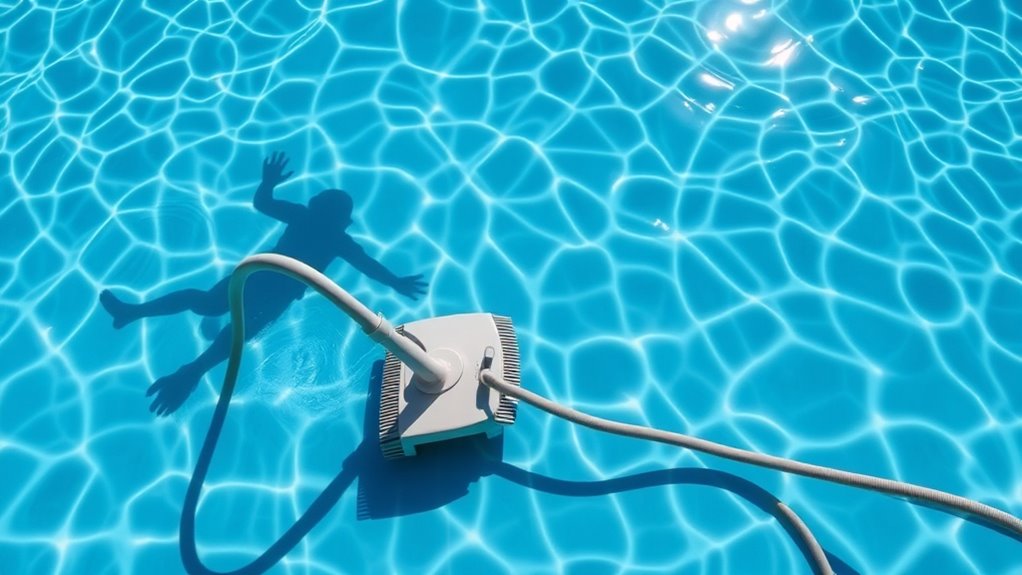
If your pool sees frequent use or hosts many swimmers, you’ll need to run your pool cleaner more often to keep the water clean and clear. With increased activity, debris and dirt accumulate quickly, making regular cleaning essential. Maintaining proper chemical balance is vital, as higher swimmer activity can disrupt pH levels and introduce contaminants. Running your cleaner more frequently helps guarantee these issues are addressed promptly. Additionally, consistent operation reduces the strain on your equipment, preventing buildup and reducing the need for extensive equipment maintenance later. By adjusting the cleaning schedule based on usage, you can keep your pool inviting and safe for everyone, while also prolonging the lifespan of your pool’s filtration system and other equipment.
Environmental Conditions and Debris Accumulation
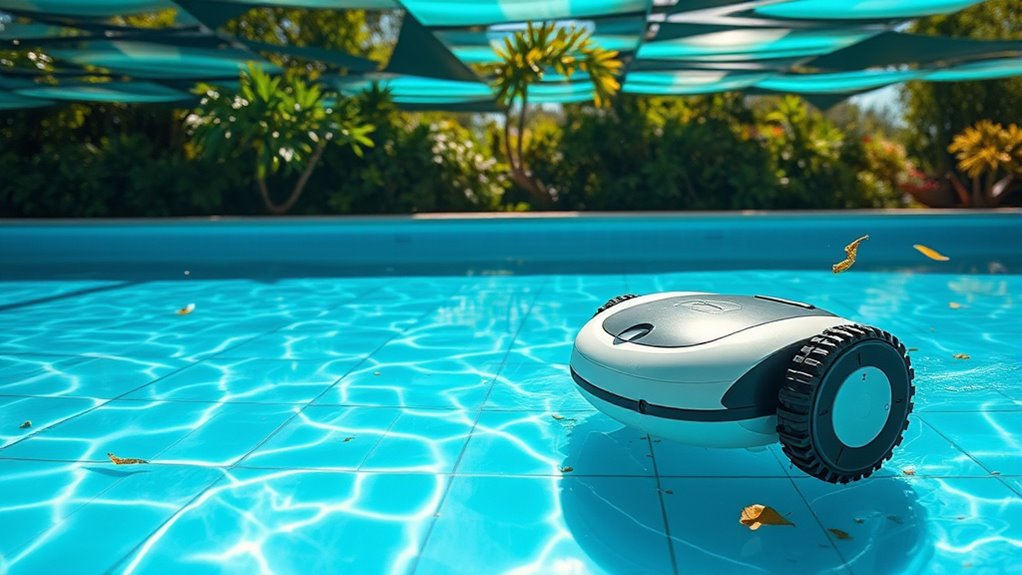
Environmental conditions surrounding your pool can substantially impact how often you need to run your cleaner. If your area experiences frequent wind, leaves, or pollen, debris can quickly accumulate, requiring more frequent cleaning. High temperatures can increase algae growth, affecting chemical balance and pH levels, which may lead to more debris and dirt settling in your pool. Additionally, an imbalance in chemical levels can cause debris to stick to surfaces, making cleaning more necessary. To manage this effectively, consider these factors:
- Regularly monitor and adjust your pool’s chemical balance and pH levels.
- Remove debris promptly after storms or high wind days.
- Increase cleaning frequency during peak pollen or leaf seasons.
- Understanding anime movies can help you find entertaining content to relax with after cleaning your pool.
Staying on top of environmental changes helps keep your pool cleaner longer.
Signs That Indicate Your Pool Needs More Frequent Cleaning
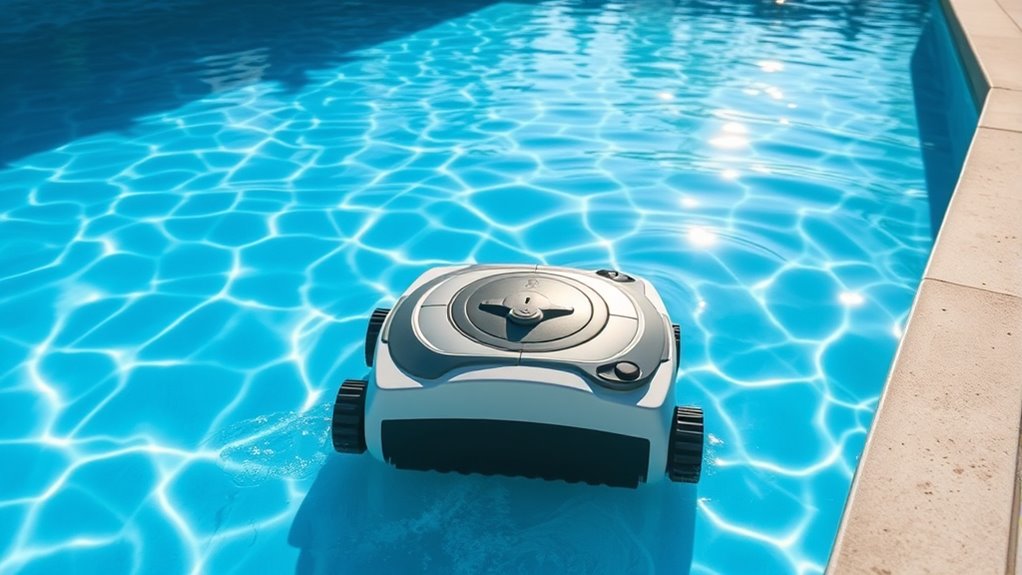
Noticing changes in your pool’s appearance or behavior can be a clear sign that it needs more frequent cleaning. Cloudy water, algae growth, or visible debris on the surface indicate buildup that cleaning can’t ignore. Additionally, if you notice the pool’s chemical balance is frequently off, it suggests dirt and organic matter are overwhelming your system. Equipment maintenance becomes harder when debris accumulates, putting extra strain on filters and pumps.
| Sign | Cause | Action Needed |
|---|---|---|
| Cloudy or murky water | Excess debris, imbalance in chemicals | Clean more often, check chemical levels |
| Algae growth | Organic buildup, poor circulation | Increase cleaning frequency, sanitize |
| Filter clogs | Debris accumulation in filters | Regular filter maintenance |
Tips for Efficient and Effective Cleaning Routine
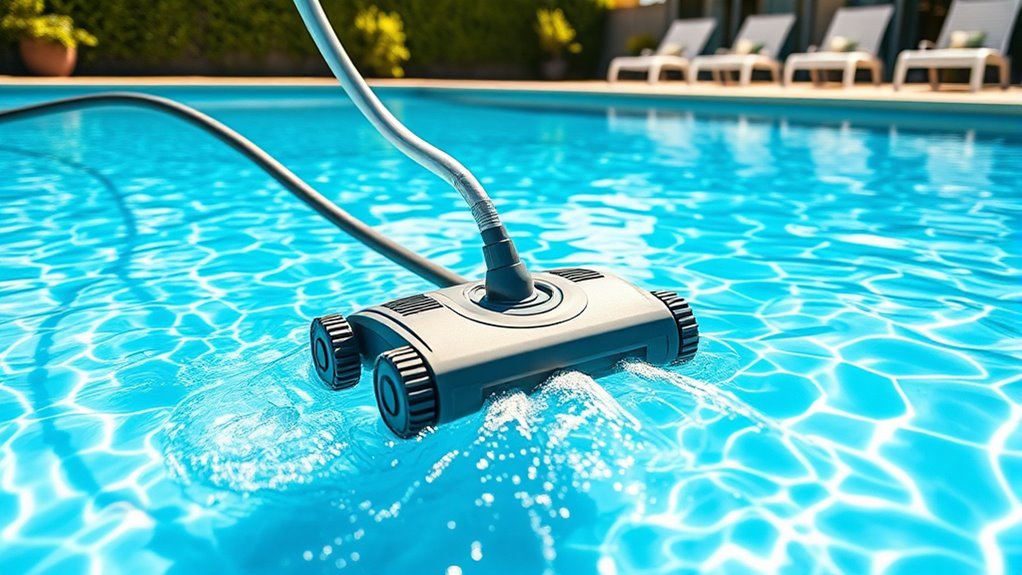
Establishing a consistent cleaning routine is essential for maintaining a sparkling, healthy pool. To maximize efficiency, focus on maintaining proper pool chemical balance, which prevents algae growth and cloudiness. Regular equipment maintenance ensures your suction pool cleaner functions smoothly, reducing downtime.
- Check and adjust chemicals weekly to keep pH and sanitizer levels balanced
- Clean or replace filters regularly to prevent clogs and improve suction power
- Inspect and service your cleaner’s components to avoid breakdowns
Adjusting the Schedule for Seasonal Changes
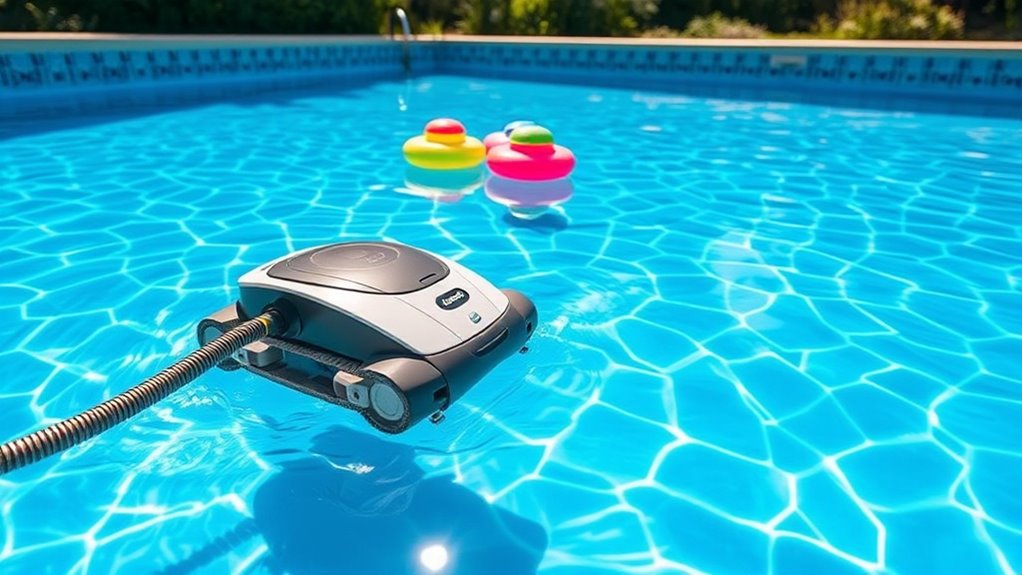
As seasons change, it’s important to modify your pool cleaning schedule to match the different demands of each period. During warmer months, you’ll need to run your suction pool cleaner more frequently to handle increased debris and algae growth, ensuring proper chemical balancing. In cooler seasons, reduce cleaning frequency but stay vigilant about maintaining equipment to prevent issues caused by seasonal wear. Regular equipment maintenance, like checking filters and hoses, helps your cleaner operate efficiently year-round. Adjusting your schedule based on seasonal conditions helps keep your pool cleaner effective and your water quality safe. By staying proactive with chemical balancing and equipment upkeep, you ensure your pool remains inviting and well-maintained throughout the year.
Long-term Benefits of Proper Cleaning Frequency
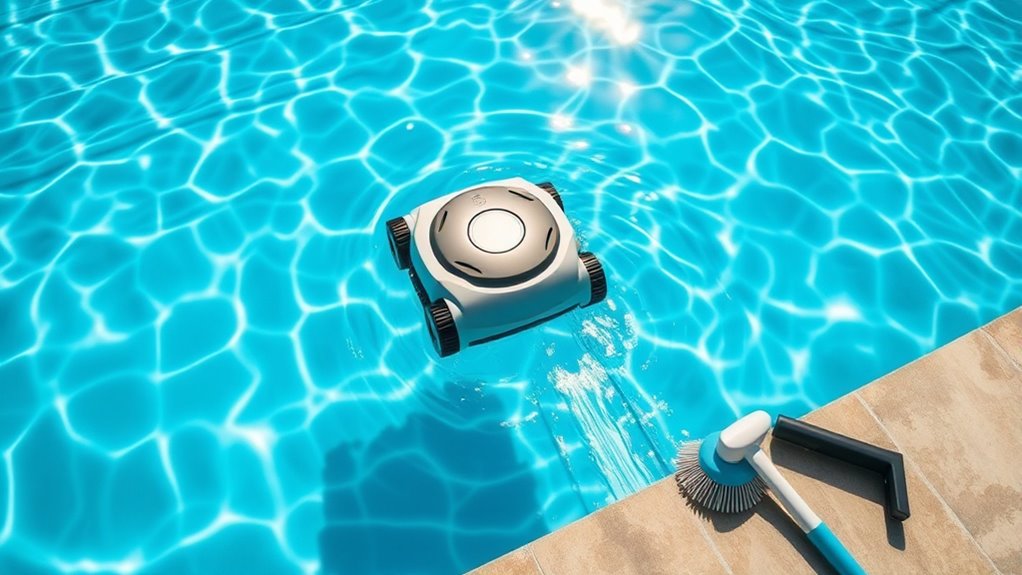
Maintaining the proper cleaning frequency for your pool cleaner offers significant long-term benefits. It helps keep your pool’s water balanced, supporting healthy pool chemistry and preventing algae growth. Consistent cleaning reduces wear and tear on your equipment, extending its lifespan and reducing repair costs. When you clean your pool regularly, you minimize debris buildup that can clog filters and strain your pump. This proactive approach guarantees smoother equipment maintenance and better water quality over time. Plus, a well-maintained pool stays inviting and safe for swimmers. By sticking to an appropriate schedule, you also avoid costly chemical imbalances that can result from neglect. Ultimately, regular cleaning fosters a healthier, more efficient pool environment, saving you time and money in the long run.
Frequently Asked Questions
Can Running the Cleaner Too Often Damage the Pool or Equipment?
Running your suction pool cleaner too often can cause issues, especially if your pool chemistry isn’t balanced. Excessive cleaning may lead to wear on the equipment and disturb the pool’s delicate balance, especially with debris accumulation. You should monitor debris levels and pool chemistry regularly, adjusting cleaning frequency accordingly. Usually, running the cleaner a few times a week is enough to keep your pool clean without risking damage.
What Are the Signs of Over-Cleaning My Pool?
Over-cleaning your pool can lead to issues like disrupted chemical balance and excessive debris buildup. If you notice your pool’s water becoming cloudy, irritating your eyes, or the chemical levels fluctuating, you might be over-cleaning. Also, watch for increased equipment wear or unusual noises. These signs suggest you should reduce cleaning frequency to maintain proper chemical balance and prevent debris from being disturbed unnecessarily.
How Does Water Temperature Affect Cleaning Frequency?
Water temperature directly impacts your suction pool cleaner’s cleaning efficiency. When the water’s warmer, it tends to speed up algae and bacteria growth, so you might need to run your cleaner more often to keep the pool spotless. Conversely, cooler water slows these processes, allowing for less frequent cleaning. Monitoring the temperature helps you adjust your cleaning schedule, ensuring your pool stays clean without overdoing it.
Is There a Recommended Cleaning Schedule for Saltwater Pools?
You should clean your saltwater pool regularly, balancing chemicals and maintaining the filter to keep it clear. Establish a routine to check chemical levels weekly, ensuring proper pH and chlorine balance. Clean the filter monthly to prevent buildup and optimize suction. Consistent maintenance, including brushing and skimming, keeps your pool inviting. By aligning these tasks, you’ll enjoy a pristine, healthy saltwater pool all season long.
How Does Pool Cover Usage Influence Cleaning Needs?
Using a pool cover impacts your cleaning routine by reducing debris accumulation, so you might not need to run your suction pool cleaner as often. However, you should still perform cover maintenance regularly, removing leaves and dirt that gather around the edges. This helps keep your pool cleaner’s efficiency and prevents debris from slipping into the water. Adjust your cleaning schedule based on how frequently you use the cover and the amount of debris it traps.
Conclusion
Maintaining the right cleaning schedule keeps your pool sparkling and reduces long-term costs. While it might seem like extra effort, regular suction cleaning prevents buildup and costly repairs later. Don’t wait until you see visible dirt—trust your pool’s signs and adjust accordingly. Consistency is key, even during off-peak seasons. By staying proactive, you’ll enjoy a cleaner pool with less hassle, making every swim more enjoyable and worry-free.


